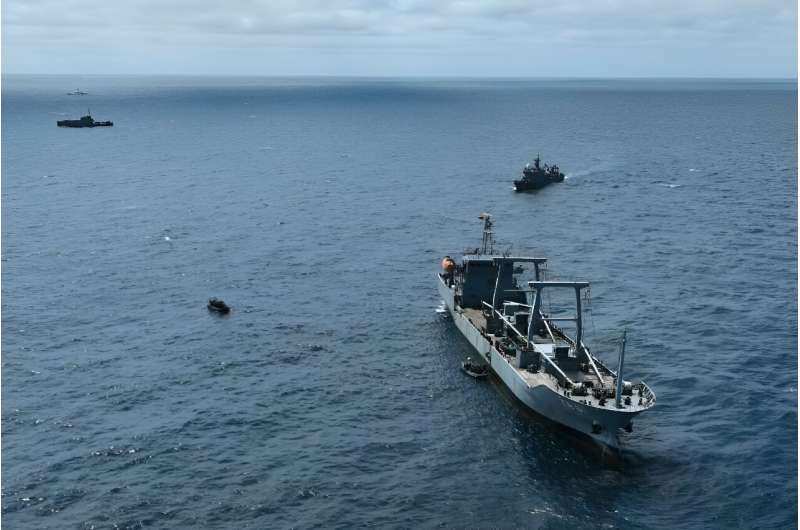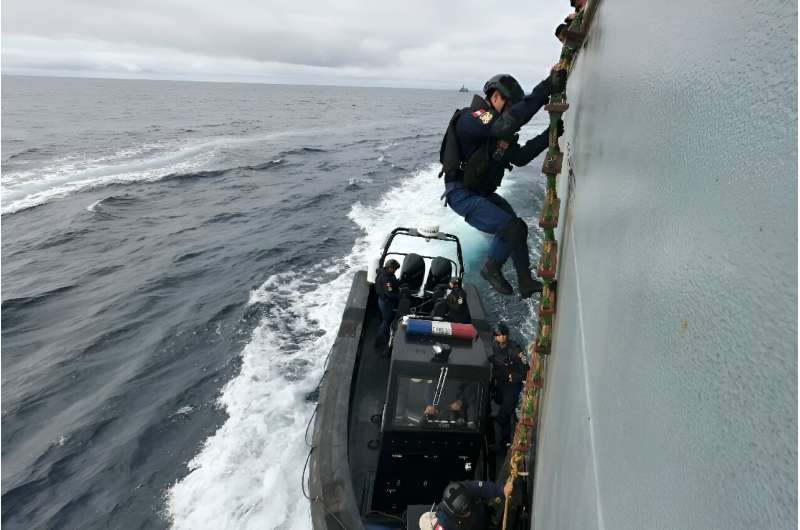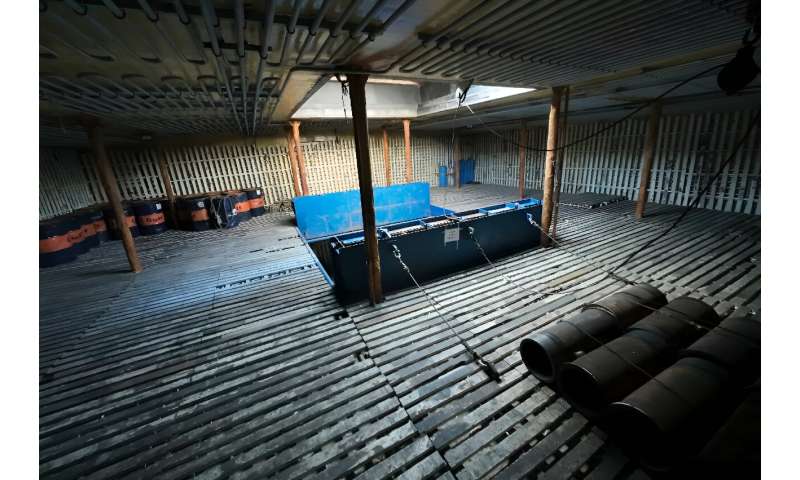This article has been reviewed according to Science X's editorial process and policies. Editors have highlighted the following attributes while ensuring the content's credibility:
fact-checked
reputable news agency
proofread
Off Ecuador's Galapagos, a former shark-poaching ship's new mission

When Ecuador's navy seized a Chinese-flagged ship off the Galapagos Islands in 2017, its hold brimmed with tons and tons of poached fish, many of them threatened species like hammerhead and thresher sharks.
Today, the vessel has been repurposed for environmental patrols of those same waters, helping to hunt down predatory vessels of the kind it once was.
It has also been renamed Hualcopo for an Indigenous leader of centuries ago who was revered for character and heroism.
On its last day of fishing illegally the 96-meter (315 foot) ship—then called the Fu Yuan Yu Leng 999—held 300 metric tons of fish, much of it cut and piled up, ready to be taken back to Asia.
"It was stunning to see the amount of fish in those holds. There were commercial species and sharks with their fins sheared off," said Jonathan Bastidas, a navy lieutenant who photographed the catch that day.
Shark fins are coveted as a delicacy in China and elsewhere in Asia.
The Hualcopo got its new mission in life three years after being confiscated.
AFP accompanied Bastidas on the Hualcopo as part of a 14-nation maritime military exercise to crack down on poaching and other environmental threats to the waters off the Galapagos, where Charles Darwin developed his theory of evolution.
During the campaign called Galapex III running from June 23 to July 9, the Hualcopo sailed as a symbol of the Ecuadoran navy as it works to protect the fragile ecosystem of the Galapagos, a UN World Heritage Site and home to many sharks.

A Chinese god
Though its purpose and crew have changed, traces of the old ship are still aboard. A finely carved wooden statue of a Chinese god known as Nezha, said to provide protection, stands in the bridge.
Incense burns around it and people leave 10 and 25 cent US coins as offerings to the deity.
The crew of the Fu Yuan Yu Leng 999 was sentenced in 2017 to three years in prison and the owners were fined $6 million.
Its holds with room for 640 tons of cargo are now used to store provisions for navy and coast guard ships that patrol Ecuador's waters.
The vessel also takes food and other supplies to the islands themselves in times of shortage.
The Hualcopo sails in pristine turquoise waters that are home to iguanas, turtles, fish and birds that exist only in the Galapagos.
The archipelago lies 1,000 kilometers (600 miles) off the coast of mainland Ecuador and is a lure for poachers, most of them Chinese.
-

A finely carved wooden statue of a Chinese god known as Nezha, said to provide protection, stands in the bridge. -

The hold of the Ecuadorean Navy ship Hualcopo is pictured on international waters of the Pacific Ocean near Galapagos.
Ecuador charged in 2020 that some 300 ships were operating inside its Exclusive Economic Zone with their radar systems turned off to avoid detection.
As it repurposed the ship, the navy painted it gray and named it after a pre-Columbian Indigenous "cacique," or leader, called Hualcopo Duchicela.
This man led local people fighting encroaching Incas as part of a dynasty that ruled some of what is today Ecuador from the 10th to the 16th centuries, according to a series of books published in the 18th century by a Jesuit priest named Juan de Velasco.
Historians question some of the accounts in De Velasco's tomes but they are widely considered literary gems key to the founding history of Ecuador.
"After serving as a poaching vessel to transport many sharks from the Galapagos maritime reserve, now it supports our efforts to fight poaching," said Boris Rodas, commander of another ship that took part in the recent military exercises off the Galapagos.
© 2024 AFP




















